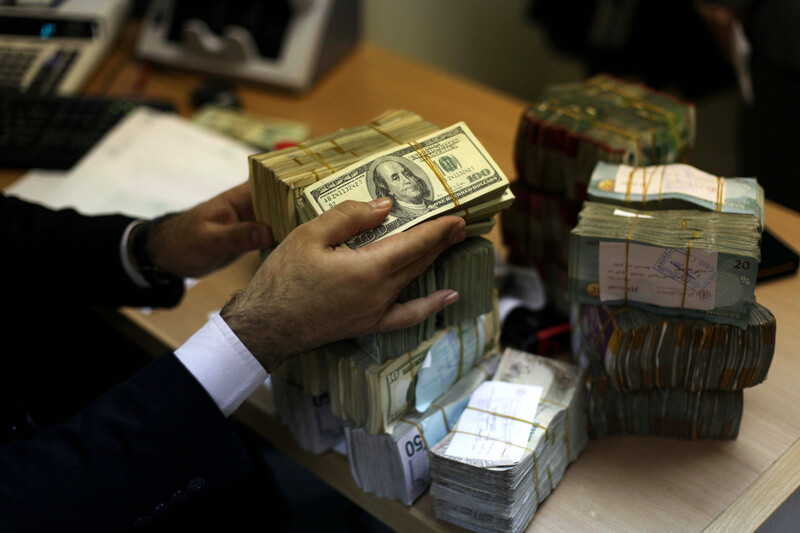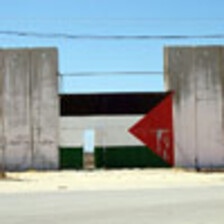The Electronic Intifada Gaza Strip 29 October 2013

One of two unlicensed banks in Gaza, Islamic National Bank has helped ensure that public sector employees get paid.
APA imagesTwo Islamic banks have played a critical role in helping Gaza cope with the siege imposed by Israel and enforced by the Egyptian government.
The Islamic National Bank and Al-Intaj have managed to stay in business despite attacks on them and threats to their operations; Israel bombed the Islamic National Bank in November last year. Meanwhile, the public sector which both banks sustain has been hampered by the closure of tunnels linking Gaza to Egypt.
Both banks operate without the approval of the Palestinian Monetary Authority (PMA), which was established under the 1993 Oslo accords to oversee the financial system in the occupied West Bank and Gaza Strip. Instead, they have been given permits to operate by the Hamas-led administration in Gaza.
Due to their lack of PMA approval, these banks can only work in the Gaza Strip, without connections with Israeli or international banks.
“Safety net”
Mohsen Abu Ramadan, an economic analyst, said that the two banks have provided “a monetary safety net for the Hamas government, and replaced the licensed banks, which refused to deal with Hamas.”
Abu Ramadan attributed the dispute over the licensing of these two banks by the PMA to the political divide that has existed between Hamas and Fatah since 2007.
The PMA’s head of monetary policy in Gaza, Saif Aldeen Owda, confirmed that these banks had not submitted licensing applications.
“We didn’t ask for a license,” Rami Abu Sha’aban, executive manager of Al-Intaj bank, said.
“We expected the PMA to refuse to license the banks, because they did not fall within the scope of its jurisdictional control,” Mohammad Skeik, director of the Islamic National Bank in Gaza, said.
The PMA requires a minimum capital of $50 million for banks, but the Islamic National Bank and Al-Intaj each have capital of $20 million, a large part of it from offering shares to the public.
Israeli banks started to cut ties with Gaza’s banks following Israel’s declaration of Gaza as a hostile entity when the elected Hamas government took power in the Strip in 2007.
The PMA’s licensed banks have avoided dealing with the Hamas government for fear of Israeli and international sanctions. This has made it difficult for the Hamas-led government and its various institutions to receive foreign currency transfers, and to pay, through licensed banks, the salaries of 40,000 public sector employees in Gaza.
Vital revenue
The pressure has increased recently with the destruction of many tunnels that had allowed goods be transported into Gaza from Egypt. Taxes levied on this trade are a vital source of revenue for the Hamas administration.
The vast majority of these tunnels have been destroyed as Egypt prepares to install a “buffer zone” around its border with Gaza. The crackdown on tunnels accelerated after the July coup in which Muhammad Morsi, Egypt’s elected president, was removed from power.
Despite these problems, the two Islamic banks have helped to ensure that public sector employees continue to get paid, though sometimes later than scheduled.
“Hurting”
Ziad al-Zaza, the finance minister in the Gaza administration, told The Electronic Intifada that “we have been greatly affected” by the closure of tunnels. “As a result, our people are hurting due to the interruption in the passage through the tunnels. Our citizens are suffering from the tightening of the siege, which has negatively affected the movement of people and merchandise.”
Alaa al-Rafati, a minister for economic affairs in the Gaza administration, told the Hamas-owned al-Risala newspaper last month that no tax increases had been introduced in response to recent events. Instead, the administration has survived by improving the collection rates of taxes on merchandise. Value-added tax and similar levies on goods represent one-fifth of the administration’s revenues, according to al-Risala.
A total of 17 licensed banks — seven of them Palestinian-owned — operate in the West Bank and Gaza Strip, according to the PMA. But only 11 of them have branches in the Gaza Strip.
The Islamic National Bank was established in 2009, while Al-Intaj opened in June this year.
Mohammad Skeik of the Islamic National Bank said that 90 percent of his bank’s services involved the issuing of Islamic loans known as murabha.
Rather than lend out money at interest, the bank buys a commodity at the request of the client. The bank then resells it to the client for the purchase price plus an agreed profit.
The remaining 10 percent of its services are focused on other activities such as commercial investment.
Obstacles
An additional obstacle faced by the Hamas-led administration is that licensed banks refuse to provide loans to their employees for small projects. They also refuse to open bank accounts or provide loans for projects by the Palestinian Investment Promotion Agency (PIPA), which is run by the Hamas-led administration.
“Banks licensed by the Ramallah government refuse to open accounts for PIPA,” Allam Ghabayen, head of PIPA in Gaza’s government, said. “That is why we only deal with the Islamic National and Al-Intaj banks, and require that guarantors receive their salaries through these two banks.”
The two banks’ success in keeping a basic economic functioning amid worsening poverty and unemployment is a testament to the steadfastness and ingenuity of the Palestinian people. But it does not alter the fact that Gaza remains under the kind of siege one associates more with the middle ages than the twenty-first century.
Hana Salah is a Palestinian financial journalist based in Gaza. She has worked with several Palestinian and international media outlets, including Turkey’s Anadolu news agency and Al-Monitor.


